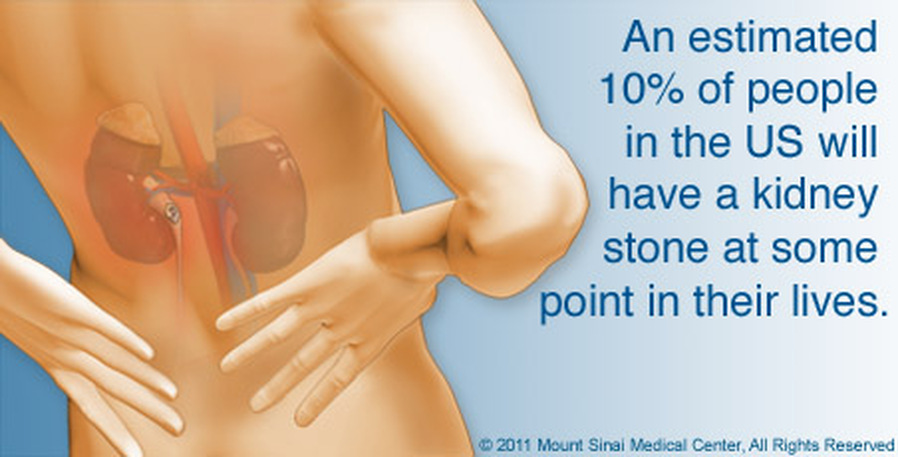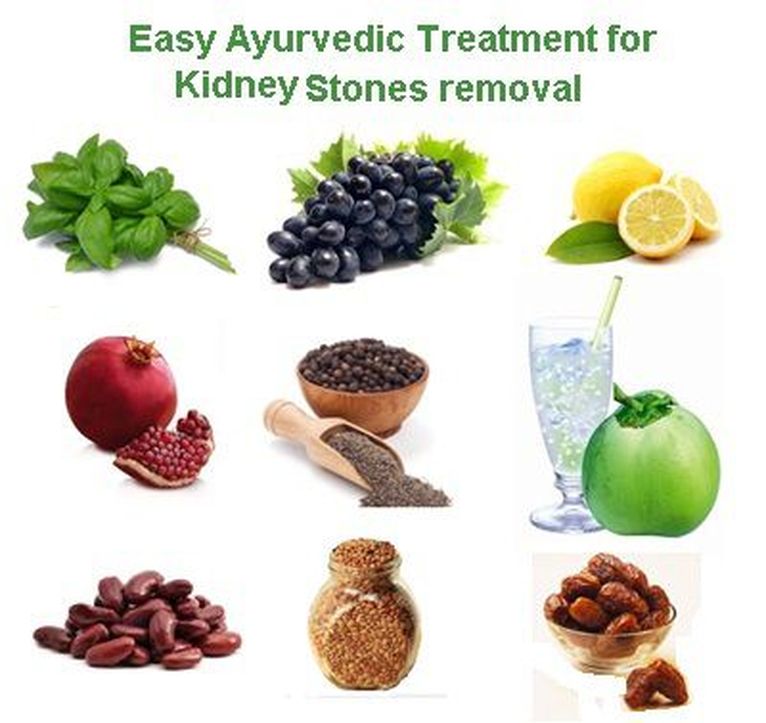
Kidney stones cause pain and discomfort in the urinary tract and sometimes they need to be removed with surgery, but not all the time. Sometimes natural food remedies can help alleviate the pain of a kidney stone and even break it up so it is easier to pass and get rid of in your urinary tract.For those of you who do not know what kidney stones are they are hard tiny stone like deposits that are formed in your kidneys made from minerals and acid salts. The stones usually form when urine becomes highly concentrated and the salts and minerals crystallize and break off which are then called kidney stones. Once the kidney stone begins to leave the kidneys it heads towards the gut and groin area cause sharp pains and sometimes nausea. Kidney stones can even make urinating painful and cause urine to look pink or brown colored. Sometimes a slight fever is present and you begin feeling like you have the flu. Treatment for kidney stones usually involves surgery if they do not pass, but most of the time they pass on their own with proper foods and a good heavy amount of liquids.
One of the best food remedies for relieving and treating kidney stones is a lemon. The juice of a lemon contains a natural acid in it called citrate. Citrate acid helps break down the kidney stone and can even help prevent kidney stones from forming in the kidneys in the first place. All you need to do is simply squeeze about 6 lemons to get ½ a cup or more of lemon juice and mix it with some cool water and suck it down. You will want to do this several times throughout the day to help breakup and prevent kidney stones. When the kidney stone passes you should continue drinking at least ½ a cup of lemon juice a day to prevent more kidney stones from forming because kidney stones do reoccur most of the time so taking preventive measures is a must.
Other citrus fruits that contain citrate acids in them as well would be oranges, limes, grapefruits, and tangerines. Mixing the juices of these citrus fruits with water and sucking it down can help break up and prevent kidney stones from forming.
Another food that is excellent for kidney stones is celery. Celery contains high healthy amounts of sodium and potassium which is needed to relieve toxic waste from the kidneys and helps prevent and remove kidney stones from the kidneys. The best way to get the health benefits from celery is to eat a couple stalks of it eat day until your kidney stones are passed.
Apples are also another fabulous food for breaking up kidney stones. Apples contain oxalates in them which helps dissolve and prevents kidney stones from forming. The best way to get the kidney stone preventing and healing benefits of apples is by drinking several cups of organic apple juice a day, or simply by eating 3 apples a day. Sometimes apple cider works best as well for dissolving kidney stones.
Cranberries are excellent for stopping the formation of kidney stones and preventing from getting bigger. The reason way is because they contain a natural acid in them that helps dissolves the minerals in kidney stones. Cranberries also have potent antioxidants and antibiotic properties to it that can help prevent urinary tract infections and keep the kidneys clear of dangerous minerals that cause the formation of kidney stones. The best way to get the healing benefits of cranberries is by either drinking pure organic cranberry juice or simply by eating sugar free organic cranberry sauce.
Surgery isn't always needed for removing kidney stones. Sometimes all you need are natural food remedies to help break up and dissolve the kidney stones so you can be pain free and happy and healthy again.

How does diet affect the risk of developing kidney stones?
Kidney stones can form when substances in the urine—such as calcium, oxalate, and phosphorus—become highly concentrated. The body uses food for energy and tissue repair. After the body uses what it needs, waste products in the bloodstream are carried to the kidneys and excreted as urine. Diet is one of several factors that can promote or inhibit kidney stone formation. Certain foods may promote stone formation in people who are susceptible, but scientists do not believe that eating any specific food causes stones to form in people who are not susceptible. Other factors that affect kidney stone formation include genes, environment, body weight, and fluid intake.
Dietary Changes to Help Prevent Kidney Stones
People can help prevent kidney stones by making changes in fluid intake and, depending on the type of kidney stone, changes in consumption of sodium, animal protein, calcium, and oxalate.
Drinking enough fluids each day is the best way to help prevent most types of kidney stones. Health care providers recommend that a person drink 2 to 3 liters of fluid a day. People with cystine stones may need to drink even more. Though water is best, other fluids may also help prevent kidney stones, such as citrus drinks.
Recommendations based on the specific type of kidney stone include the following:
Calcium Oxalate Stones
- reducing sodium
- reducing animal protein, such as meat, eggs, and fish
- getting enough calcium from food or taking calcium supplements with food
- avoiding foods high in oxalate, such as spinach, rhubarb, nuts, and wheat bran
- reducing sodium
- reducing animal protein
- getting enough calcium from food or taking calcium supplements with food
- limiting animal protein
How much fluid should a person drink to prevent kidney stone formation?
People who have had a kidney stone should drink enough water and other fluids to produce at least 2 liters of urine a day. People who have had cystine stones may need to drink even more. The amount of fluid each person needs to drink depends on the weather and the person’s activity level—people who work or exercise in hot weather need more fluid to replace the fluid they lose through sweat. A 24-hour urine collection may be used to determine the volume of urine produced during a day. If the volume of urine produced is too low, the person can be advised to increase fluid intake. Drinking enough fluid is the most important thing a person can do to prevent kidney stones.
How does sodium in the diet affect kidney stone formation?
Sodium, often from salt, causes the kidneys to excrete more calcium into the urine. High concentrations of calcium in the urine combine with oxalate and phosphorus to form stones. Reducing sodium intake is preferred to reducing calcium intake.
The U.S. recommended dietary allowance (RDA) of sodium is 2,300 milligrams (mg), but Americans’ intake averages 3,400 mg, according to the U.S. Department of Agriculture. The risk of kidney stones increases with increased daily sodium consumption. People who form calcium oxalate or calcium phosphate stones should limit their intake to the U.S. RDA level, even if they take medications to prevent kidney stones.
How can a person limit sodium intake?
Learning the sodium content of foods can help people control their sodium intake. Food labels provide information about sodium and other nutrients. Keeping a sodium diary can help a person limit sodium intake to 2,300 mg. When eating out, people should ask about the sodium content of the foods they order.
Some foods have such large amounts of sodium that a single serving provides a major portion of the RDA. Foods that contain high levels of sodium include:
- hot dogs
- canned soups and vegetables
- processed frozen foods
- luncheon meats
- fast food
- monosodium glutamate, or MSG
- sodium bicarbonate, the chemical name for baking soda
- baking powder, which contains sodium bicarbonate and other chemicals
- disodium phosphate
- sodium alginate
- sodium nitrate or nitrite
How does animal protein in the diet affect kidney stone formation?
Meats and other animal protein—such as eggs and fish—contain purines, which break down into uric acid in the urine. Foods especially rich in purines include organ meats, such as liver.
Animal protein may also raise the risk of calcium stones by increasing the excretion of calcium and reducing the excretion of citrate into the urine. Citrate prevents kidney stones, but the acid in animal protein reduces the citrate in urine.
How does calcium in the diet affect kidney stone formation?
Calcium from food does not increase the risk of calcium oxalate stones. Calcium in the digestive tract binds to oxalate from food and keeps it from entering the blood, and then the urinary tract, where it can form stones. People who form calcium oxalate stones should include 800 mg of calcium in their diet every day, not only for kidney stone prevention but also to maintain bone density. Moringa leaves contain 14 times the amount of calcium as milk. Hemp seeds contain 6 times the amount of calcium as milk. WOW!
How does oxalate in the diet affect kidney stone formation?
Some of the oxalate in urine is made by the body. However, eating certain foods with high levels of oxalate can increase the amount of oxalate in the urine, where it combines with calcium to form calcium oxalate stones. Foods that have been shown to increase the amount of oxalate in urine include
- spinach
- rhubarb
- nuts
- wheat bran
Studies have shown that being overweight increases the risk of kidney stones, particularly uric acid stones. Diets that are low in carbohydrates have been shown to further increase the risk of uric acid stones and should be avoided.
Points to Remember
- Kidney stones can form when substances in the urine—such as calcium, oxalate, and phosphorus—become highly concentrated. Diet is one of several factors that can promote or inhibit kidney stone formation.
- Four major types of kidney stones can form: calcium stones, uric acid stones, struvite stones, and cystine stones.
- Drinking enough fluid is the most important thing a person can do to prevent kidney stones.
- People who have had a kidney stone should drink enough water and other fluids to make at least 2 liters of urine a day.
- Sodium, often from salt, causes the kidneys to excrete more calcium into the urine. High concentrations of calcium in the urine combine with oxalate and phosphorus to form stones. Reducing sodium intake is preferred to reducing calcium intake.
- Meats and other animal protein—such as eggs and fish—contain purines, which break down into uric acid in the urine.
- Calcium from food does not increase the risk of calcium oxalate stones. Calcium in the digestive tract binds to oxalate from food and keeps it from entering the blood, and then the urinary tract, where it can form stones.